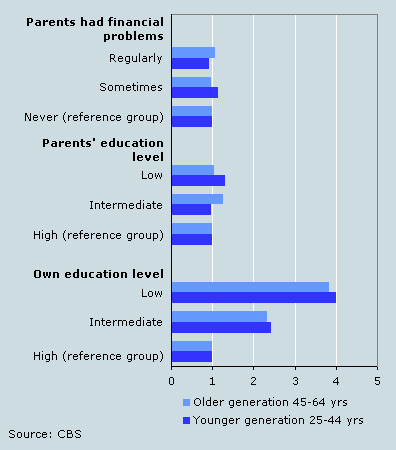Born poor .

The education level and financial position of a child’s parents determine to an important degree whether that child will grow up to have a high level of income.
Parent’s education determines child’s education
The education level of parents is largely determinant for the education level of their children. Children of parents with low education levels will themselves remain lower educated, although there is a generation effect. 25–44 year-olds with lower educated parents are six times more likely to have a lower education level themselves than their peers with higher educated parents. For older generations this likelihood is higher: 45–64 yea-olds with low educated parents are eleven times more likely to have a low level of education themselves than 45–64 year-olds with higher educated parents.
Likelihood of low level of education, 2005

Parental income affects child’s education
The former financial situation of a child’s parents also plays a role in his or her education. But this relationship, too, has its effect through the level of education. Children whose parents regularly had financial problems are twice as likely to be lower educated than children of parents with no financial problems. This is true for both 25–44 year-olds and 45–64 year-olds.
Own education determines income
The income of people with a higher level of education is higher than that of people with a lower level of education.
People with a low education level are four times more likely to have a low income than people with a higher level of education. They are more likely to be in the lowest regions of the income distribution. There is hardly any difference between the two generations. There is no direct correlation between education of the parents and income position of their children.
Likelihood of low income position, 2005

Lian Kösters